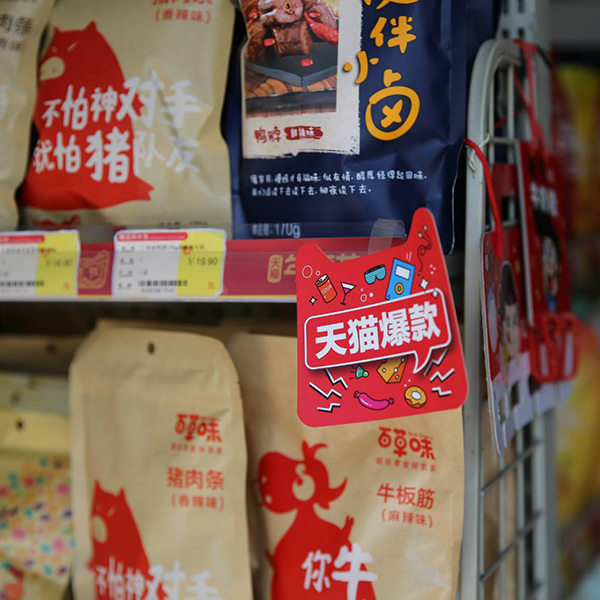Ecommercestrategychina.com uses cookies and other technologies to provide you a better browsing experience. You can get more information regarding the use of cookies, or decline it whenever by clicking Privacy Policy. By using this site or clicking “Okay”, you give us the consent to the use of cookies.
OKAY
Alibaba's LST (lst.1688.com, Alibaba's LST is a one-stop shopping platform for ordering, logistics, marketing and other services for offline retail shops) has created a number of new features for China's high street shops that make Chinese people’s life easier and more convenient than before.
With Alibaba’s LST services, people do not have to go downstairs to get snacks when they are busy, because a delivery person can pick them up and bring them to the customer’s address. If you are looking for a restaurant at midnight because you are hungry, this is no longer a problem as vending machines can satisfy your stomach. Paying with your face ID saves time in the queue at the checkout. LST also provides a printing service and umbrella sharing to serve people’s emergencies…
Recently, Alibaba's LST has released its plan of "Tmall Store 2.0", and launched new artificial intelligent tools for shopkeepers, such as the intelligent store manager "Ruyi" and a simple unmanned retail machine, with the aim to realise the modernisation and transformation of traditional shops.
"Ruyi" is a point of sale (POS) machine that contains information about goods that are often sold in 98% of shops on the market, and creates files for goods by scanning codes. What is the difference between Ruyi manager and the traditional POS machine? Combined with great data from the Alibaba platform, Ruyi will tell a CBD shop owner which imported instant noodle brand is the most popular with office workers and will tell a shop that sells several types of mineral water to weed out those that are not of high consumer interest. Ruyi can even give small inventory alerts, refill with one click, and propose the lowest selling price based on market changes.
By clicking on "Ruyi", the high street shops can open an account for the food delivery service on Eleme, put the goods purchased from LST to the online shelves and set up their own shops that will be displayed on the Amap and Taobao Search. Since joining the Alibaba’s Tmall Store plan, revenue from the takeaway and delivery of a local supermarket in Hangzhou has nearly tripled.
It used to be difficult for traditional shops to stay open 24 hours a day like convenience-store chains. To help small shops extend their opening hours and expand their business, LST has introduced the unmanned vending machine. These Tmall shop keepers can not only rent the machine at no cost, but also choose the place where they set up vending machines according to the consumption habits of the residents of the community. It could be in the front of their Tmall shops, gyms and other locations. In addition, it can make a smart replenishment under the big data recommendation in the back-end platform.
According to the data, there are about 6 million Tmall shops nationwide, but the sales are not optimistic. "In the past year, the number of Tmall branches across the country fell by 5%. 30% of those who survive have suffered a decline in their business. 3% of shop owners even want to close their shops." said Alibaba Group Vice President. In the past, the distribution mode of traditional stores is split into the first, second and third wholesale. In the absence of effective human resources management and data statistics, brand costs continue to rise while sales execution is declining.
Alibaba's LST is going to change this situation. Since the launch of Tmall Store Brand Plan in August last year, the company has covered more than 1 million shops. The differentiated products help Tmall shops optimise their product structure and improve business efficiency and competitiveness.
Changes at the consumer end have created new requirements for service upgrades. In the future, LST may give us whatever we want when we move our fingers on mobile devices. If you want food without going outside, you can place an order on the 24 hour take-out platform and get the package fast. In the future, Tmall shops can even provide services such as printing, washing clothes and sharing umbrellas to meet the emerging needs of "neighbours" and make life easier for consumers. The Tmall Store 2.0 Project is not only a practice and breakthrough for Alibaba in the new retail industry, but also offers many opportunities for the development of thousands of physical businesses.
Please Login to add comments.

$9.99 $19.98

$9.99 $19.98
By GRLpGpAG December 10th, 2023
555
By GRLpGpAG December 10th, 2023
555
By GRLpGpAG December 10th, 2023
555
By GRLpGpAG December 10th, 2023
555
By GRLpGpAG December 10th, 2023
555
By GRLpGpAG December 10th, 2023
P0KnxGVf
By GRLpGpAG December 10th, 2023
-1 OR 2+231-231-1=0+0+0+1 --
By GRLpGpAG December 10th, 2023
-1 OR 2+76-76-1=0+0+0+1
By GRLpGpAG December 10th, 2023
-1' OR 2+568-568-1=0+0+0+1 --
By GRLpGpAG December 10th, 2023
-1' OR 2+847-847-1=0+0+0+1 or '6HMsiK5F'='